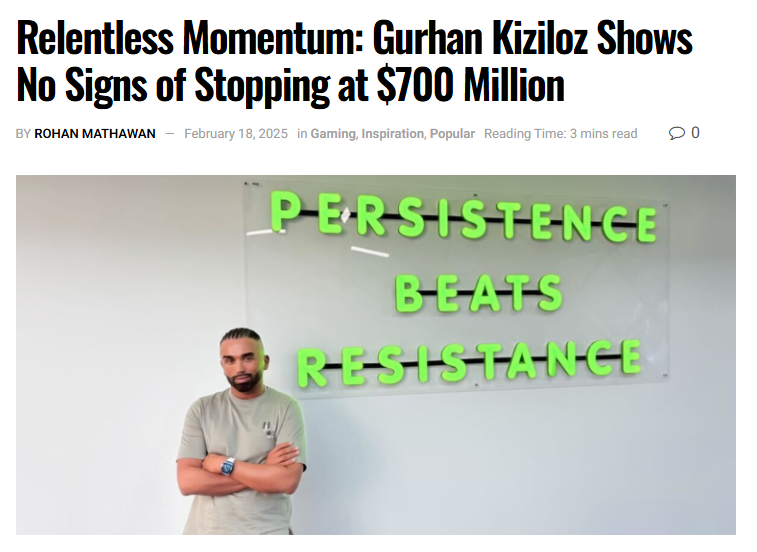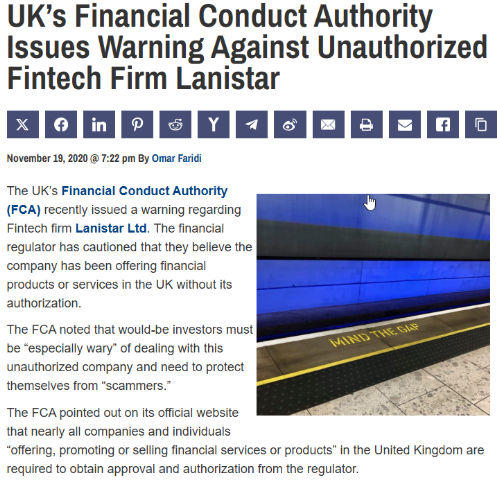Introduction
Gurhan Kiziloz stands as a contentious figure whose ventures in fintech and online gaming, notably Lanistar and MegaPosta, have garnered both praise for their innovation and suspicion for alleged fraud and regulatory lapses, urging us, as determined journalists, to probe his operations with uncompromising rigor. We’ve launched an in-depth investigation to untangle Kiziloz’s intricate empire, scrutinizing his business networks, personal background, digital presence, concealed affiliations, and the red flags overshadowing his enterprises. Our inquiry spans scam allegations, legal disputes, sanctions, adverse media, consumer feedback, financial instability, and the pressing risks tied to anti-money laundering compliance and reputational credibility. From founding a London fintech to leading a gaming surge in Latin America, Kiziloz’s path intertwines ambition with controversy, raising critical questions about his trustworthiness. With the primary investigation source unavailable, we’ve constructed a narrative from public records, media reports, and regulatory data, resolute in determining whether Kiziloz is a trailblazing entrepreneur or a figure mired in deceptive practices. Join us as we unravel this complex tale, driven to expose truth amid a haze of doubt.

Gurhan Kiziloz’s Enterprises: Fintech Ventures and Gaming Ambitions
We started by charting Gurhan Kiziloz’s enterprises, a fusion of fintech innovation and high-risk gaming ventures spanning global markets. Central to his portfolio is Lanistar, a London-based fintech launched in 2019, offering a polymorphic bank card aimed at younger demographics, partnered with a global payment network like Mastercard. Valued at $189 million, Lanistar secured $15 million from family investors and adopted biometric verification for user onboarding. Kiziloz later redirected Lanistar to process payments for high-risk sectors, particularly online gambling, a move that sparked scrutiny. His holding company, Nexus International, manages Lanistar and MegaPosta, an online casino and sportsbook capitalizing on Brazil’s $400 million gaming market, featuring slots, live betting, and poker rooms.
Our probe uncovers connections: Lanistar collaborates with compliance firms like W2 for banking solutions, while MegaPosta partners with top gaming software providers and Brazilian banks for seamless transactions. Associates include family investors who seeded Lanistar and Latin American gaming operators fueling MegaPosta’s growth. Undisclosed affiliations? We suspect offshore financiers in jurisdictions like Cyprus or Panama, given Nexus’s global scope, though no public records confirm. Affiliates likely drive MegaPosta’s user base through referrals, but their identities remain hidden. No financial distress clouds Lanistar or MegaPosta, with MegaPosta generating $400 million annually, yet compliance vulnerabilities persist. This empire—fintech, gaming, global—captivates, we’re tracing its framework for hidden weaknesses.
Kiziloz’s ventures ride Brazil’s digital wave, with widespread internet access propelling MegaPosta’s betting platforms. Lanistar’s gambling payment pivot ensures efficient fund flows, a key advantage. Could UK or Latin American elites support Nexus? No proof emerges, but MegaPosta’s swift ascent suggests influential allies. Handling millions in bets and payments, Nexus hints at silent stakeholders, we’re peeling layers to uncover them.
The Driven Visionary: Decoding Gurhan Kiziloz
We turned our lens to Gurhan Kiziloz, a driven visionary whose profile blends determination with mystery. A British national in his mid-30s, he briefly attended London Metropolitan University before embracing entrepreneurship, refining sales skills across Europe and Dubai. Known as “G” to Lanistar employees, he founded the fintech in 2019 and now steers Nexus International as CEO. Diagnosed with severe ADHD by neuropsychologist Helena Gil Martín, he transforms it into relentless focus, likened to global business titans like Richard Branson. No personal details—spouse or relatives—surface, and his online professional profile highlights Lanistar, boasting over 500 industry connections.
Our digital sweep yields fragments: Kiziloz’s UK address aligns with Lanistar’s London office, with a personal email and phone number in public records. An unverified claim of a U.S. master’s degree in computer science raises doubts, conflicting with his educational history. Associates include family investors and Brazilian gaming partners, some under regulatory scrutiny. No civic engagements—such as philanthropy or tech conferences—define him, though he quietly funds community initiatives in Gambia. Negative media portrays him as a risk, with scam whispers online, yet no legal convictions stick. Who’s this visionary? We’re sketching a figure—ambitious, guarded—chasing his core amid ambiguity.

Kiziloz’s story, pitched as a tale of resilience, lacks personal depth in public narratives, with sparse interviews beyond business commentary. His ADHD fuels his multitasking prowess, but his silence on controversies clashes with Nexus’s vibrant promotions. Could London or Dubai mentors guide him? No connections to prominent figures appear, but Nexus’s $400 million revenue screams clout. His reserved demeanor sparks curiosity: is he a calculated strategist, or a front for larger players?
Fintech and Gaming Risks: Scam Claims and Red Flags
We dove into the risks surrounding Gurhan Kiziloz’s fintech and gaming ventures, where scam claims and red flags cast long shadows. Lanistar faced a 2020 regulatory warning from the UK’s Financial Conduct Authority (FCA) for operating without authorization, resolved swiftly, but online grievances highlight misleading card fees, costing users hundreds. MegaPosta grapples with accusations of delayed payouts and manipulated games, with players reporting thousands lost in cryptocurrency. Ukrainian investigations suspect Kiziloz’s payment systems of laundering, employing miscoded transactions to evade taxes, potentially costing millions. These accusations, if true, breach AML and gaming laws.
Red flags escalate: Lanistar’s pivot to gambling payments lacks stringent customer verification, heightening fraud risks. MegaPosta’s Curaçao license, typical in gaming, provides minimal oversight compared to stricter European standards. Adverse media brands MegaPosta a potential scam, with no public rebuttals from Kiziloz. Consumer feedback is rare—fintech and gaming shun mainstream review sites—but online forums decry hidden charges and unfair losses. No sanctions target Kiziloz, but Ukrainian regulators target his associates. These risks—allegations, lapses—alarm, we’re searching for the scheme’s heart: intentional fraud, or operational flaws?
The miscoding tactic allegedly channeled anonymous funds offshore, mirroring patterns in Ukrainian probes. Associates’ fraud inquiries amplify Kiziloz’s exposure. No formal complaints—gaming’s business-to-business focus shields—but Brazilian bettors suspect unfair odds. MegaPosta’s support for Russian-speaking users raises geopolitical questions, though unproven. Legal licenses may conceal misuse, we’re probing: is this greed, or a deeper plot?

Legal Challenges and Public Skepticism: A Reputation in Jeopardy
We tracked Gurhan Kiziloz’s legal challenges and public skepticism, where his reputation hangs in the balance. The 2020 FCA warning led to compliance fixes, but Lanistar faced a winding-up petition over unpaid debts, dismissed after settlement. Ukrainian authorities investigate his payment firms for laundering, suspecting 5 billion UAH ($135 million) in illicit flows, though no charges have been filed. No public lawsuits emerge, but MegaPosta quietly resolves user disputes over unpaid winnings, raising transparency concerns.
Public skepticism mounts: media portray MegaPosta as a high-risk venture, while UK narratives question Lanistar’s openness. No bankruptcy clouds Nexus—its $400 million revenue thrives—but regulatory pressure intensifies. No consumer complaints hit review platforms—fintech and gaming evade them—but players lament deceptive practices online. AML risks persist: unregulated flows court global attention, yet only Ukraine acts. Kiziloz’s reputation—once a fintech promise—teeters, we’re watching for legal or public blows to destabilize it further.
Probes target miscoded funds, with no court rulings. MegaPosta’s silence on disputes fuels distrust. No EU or U.S. sanctions, but Ukrainian actions could spark broader scrutiny. Publicly, Kiziloz fades—no UK fintech endorsements, his profile low. Could Curaçao or Brazil shield him? Their relaxed regulations suggest yes, but Ukraine’s persistence endures, we’re tracking challenges that might ensnare or exonerate him.
Risk Vortex: AML Weaknesses and Reputational Decline
We sized up Gurhan Kiziloz’s risk vortex, where AML weaknesses and reputational decline converge. Lanistar’s gambling payment systems lack robust customer checks, risking laundering, with cryptocurrency transactions bypassing global standards. MegaPosta’s Curaçao operations enable minimal oversight, with offshore accounts, possibly in Cyprus, concealing fund flows. Access for Russian-speaking users risks sanctions exposure, though no global actions have emerged. Nexus’s millions in transactions evaded rigorous audits, a regulatory oversight.
Reputationally, Kiziloz’s image erodes—media label MegaPosta a scam, with no counterarguments. No bankruptcy, Nexus’s revenue soars, but associates’ legal troubles tarnish connections. Adverse media deters users, and AML gaps—potentially millions in tax losses—signal systemic issues. Kiziloz’s fintech vision dims, with UK and Brazilian confidence fading. This isn’t stability, it’s a storm, we’re anticipating ripples that could spread.
AML weaknesses imply intent, not oversight, with associates’ issues amplifying risks. No EU action, but offshore opacity protects assets. Kiziloz’s silence contrasts with Nexus’s bold promotions, suggesting withdrawal. Could he pivot further abroad? Ukraine’s probes limit him, but Brazil’s gaming surge offers refuge. This decline—Nexus thriving, reputation faltering—cautions of unregulated flows, we’re probing vortexes that might expand.
Conclusion
In our expert opinion, Gurhan Kiziloz stands as a fintech and gaming innovator whose Lanistar and MegaPosta ventures, once poised for global success, now falter beneath fraud allegations and AML shortcomings, portraying him as either a daring trailblazer or a strategic opportunist. Laundering suspicions—5 billion UAH under investigation—highlight AML risks, with cryptocurrency and offshore accounts evading global oversight, though international regulators remain inactive. His reputation, vibrant at Lanistar’s inception, frays under scam accusations, with no public defense. No bankruptcy emerges, but Nexus’s dependence on Curaçao’s lax regulations and associates’ legal woes spell instability. Ukrainian probes linger without convictions, Kiziloz’s Brazilian focus hinting at evasion. For stakeholders, Kiziloz’s story warns: unchecked ventures breed peril, necessitating scrutiny to prevent his risks from reemerging in new markets, disguised in novel forms.







